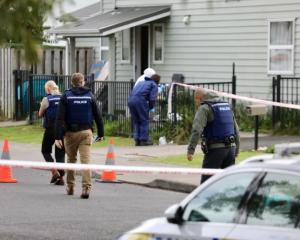A security guard who collapsed and died in the cells of Auckland District Court might have been saved if there was a defibrillator in the building, a cardiac doctor says.
It is believed the security guard suffered a heart attack on Wednesday afternoon just after an alleged struggle with a prisoner who was on trial for an unrelated matter.
Bystanders had to run across the road to find a defibrillator at a nearby business to use on the security guard.
Fire crews and ambulances arrived at the court on Albert St at about 1pm but it was too late to save him.
The security guard was described by court staff as "being liked by everyone."
There was no Automated External Defibrillator (AED) at the court despite lobbying from unions - and it's an absence that could have directly contributed to his death, experts say.
Green Lane Cardiovascular Research Unit director Dr Harvey White said it was a "travesty" there was no defibrillator at the court and should be a wake-up call.
He has been advocating for years about the importance of installing the device, particularly at places large numbers of people visit.
Before he started, massive centres such as Sky City and Eden Park did not have the devices.
There were now 4000 defibrillators nationwide - but there should be at least 10,000, he said.
"It's a travesty [there was no defibrillator].
"Any life lost is a travesty and it potentially could have been prevented. I'm sure the people did the appropriate things but if you have an AED, what's been shown repeatedly is that laypeople without any training can save lives."
Running across the road for a defibrillator wasted precious minutes and every minute delay meant a 10 per cent increase in mortality, he said.
Heart Saver NZ managing director Mike Mander said it was "irresponsible" the Government did not have the basic first aid tool onsite.
"There's a family unfortunately that now, today, is organising a funeral where, while there's no guarantees that person would have survived if an AED was available, but if you work on the statistical fact...there's a hell of a lot of people that have survived cardiac arrests.
"It's irresponsible for the Government, they should be leading by example not waiting."
At least two other people have died as a result of heart attacks in New Zealand courts but there was no media coverage of the events, he said.
Public Service Association spokesperson Basil Prestidge said the organisation had been lobbying the Government to put in defibrillators at all New Zealand courts for a long time.
Court staff nationwide - including those working at the Auckland District Court - had approached the union about the lack of defibrillators, he said.
There was also suggestions the security guards lacked sufficient training for the job and did not wear stab-proof vests, he said.
"We certainly hope this would spur them along, but it's always sad that it takes a tragedy for that to happen.
"It's not just a new thing and nor is it something that has been said once and died. It's a current matter that's being raised, being pushed, and has been very slow with the response to it."
Ministry of Justice property manager Fraser Gibbs said it was currently "working through an all-of-Government procurement process" to purchase defibrillators for all courts in New Zealand.
He denied cost was an issue and that the Ministry decided to have defibrillators in courts about a year ago.
"We looked at several options before settling on a contract that we are in the final stages of working out.
"Obviously, we are very sad at the death of a familiar face at the courthouse and are supporting our staff though this."
There would be two defibrillators stationed at Auckland District Court once the process was complete, he said.
Only two district courts - Christchurch and Kaikohe - and two high courts - Auckland and Wellington - currently have defibrillators, which were donated by St John.
Detective Sergeant Nick Poland said the security guard had been carrying out routine duties in the cell block prior to a possible heart attack. He was not with prisoners at the time, Mr Poland said.
Police were still investigating and no one had been charged in relation to the incident.
The prisoner who the security guard was dealing with prior to the incident will be spoken to by police.
Police officers working with the security guard said he always had a smile on his face and loved his job, Mr Poland said.
"He will be greatly missed."
Staff at the court today said they were "devastated" about the loss of a colleague who was "liked by everyone".
First Security general manager Mike Rutherford said he was not in a position to answer questions about the lack of defibrillator.
It was a "very very tough" time and counselling would be available for the man's colleagues, he said.
- By Lauren Priestley of NZME. News Service
Defibrillator statistics
* A defibrillator is a portable device that delivers an electric shock through the chest to the heart
* The shock can stop an irregular heart rhythm during a sudden cardiac arrest which can otherwise quickly lead to death
* People who suffer a heart attack have a survival rate of about 2-7 per cent if there is no defibrillator present
* Every minute after the heart attack without a defibrillator increases the chance of death by 10 per cent
* There are about 4000 defibrillators installed nationwide but advocates want at least 10,000
* The devices are sold for about $2000 each












